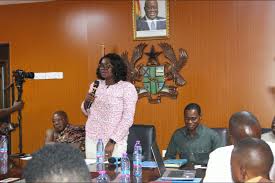The Commission for Human Rights and Administrative Justice (CHRAJ) has expressed worry about the increasing and disturbing cases of single parenting and child non-maintenance in the Bono Region.
Mr John Tsagli, the Bono Regional Administrator, CHRAJ said the cases were increasing to streetism, alms-begging and hawking among the innocent children, and therefore called for collective efforts to tackle broken homes and marital problems and to tackle the menace before it was out of control.
He was speaking in an interview with the Ghana News Agency (GNA) on the side-lines of a community sensitization forum on women and girls’ inclusion in the decision making process held at Baakoniaba in the Sunyani Municipality.
The Sunyani-based Women Association for Environmental Sustainability (WAES) in collaboration with WIDA, Non-Governmental Organisations organised forum.
It was in line with a project being implemented by the two NGOs with funding from the Global Greengrants Fund (GGF) titled “empowering women for sustainable development through inclusion” which seeks to empower women to participate in the decision making process at all levels.
Mr Tsagli noted that preliminary investigations indicated that economic hardships were contributing to marital problems and divorces, saying, because some men and husbands were unable to cater for or meet the economic demands of their spouse, marital problems kept increasing in the region.
He said though it was the responsibility for men and husbands to provide or cater for the financial needs of the family, it was also imperative for women and wives to also support their husbands in meeting the needs of the family as well.
Mr Tsagli therefore advised women to at least find something worth doing or engage in petty trading, adopt the culture of savings, and support their husbands financially, instead of concentrating or spending their resources on frivolous activities such as expensive funeral clothes and weddings.
Men or husbands must also endeavour to empower their wives or spouse economically, he advised.
Mrs Theresah Adjei-Boafo, the Director, WAES, expressed worry that women were always relegated to the background in decision making, due to some outmoded cultural practices, though they formed the chunk of the nation’s population.
There is therefore the need to empower and inspire women to be confident and contribute to the decision making process in the family and society, she stated.
Mrs Adjei-Boafo said implementation of the four-month project was making a huge impact, transforming the lives of many women, and expressed appreciation to the GGF, WIDA and other partners for the project.















